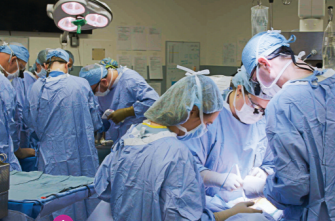When Jennifer began dating Drew in 2007,
2007年,詹妮弗開始跟德魯約會(huì),
while she was a student at Philadelphia's Drexel University, she told him about her MRKH at the outset.
當(dāng)時(shí)她還是費(fèi)城德雷塞爾大學(xué)的學(xué)生,她一開始就告訴了德魯她患有MRKH。
"She was open about it from the beginning," says Drew, who was attending nearby Temple University.
德魯說,“她一開始就毫無隱瞞”,德魯在附近的天普大學(xué)上學(xué)。
As they fell in love, they talked about how much they both wanted a family.
他們相愛的時(shí)候,互相都表明非常想要擁有一個(gè)家庭。
"We both knew we'd be parent someday; we just didn't know how," says Drew.
“我們都知道終有一天我們會(huì)為人父母;只是不知道會(huì)以何種方式。”德魯說。
They married in 2014 and not long after began IVF procedures
2014年他們結(jié)婚了,不久便開始了試管授精步驟,
(some women with MRKH have functioning ovaries that produce eggs) in the hopes of finding a surrogate.
(有些患有MRKH的女性的卵巢可以正常產(chǎn)生卵子),希望能找到代孕。

All the while, says Drew, who's 32,
32歲的德魯說,有段時(shí)間
they were fielding "awkward, painful" questions from well-intentioned friends and family about when they were planning to have kids.
他們開始面臨心懷好意的親友們“尷尬、痛苦”的問題,問他們何時(shí)準(zhǔn)備要小孩。
"How do you even talk about it?" he adds. "So you just lie and suffer in silence."
“你該怎么說呢?”他說,“你只能一直撒謊,然后獨(dú)自難受。”
By December 2017 Jennifer had spent years learning everything she could about MRKH
到2017年12月,詹妮弗已經(jīng)用了很多年了解她能知道的所有關(guān)于MRKH的信息,
and joining various support groups for women with the disorder.
并且加入了幾個(gè)患有這種疾病的女性互助群體。
It was through one such group on Facebook that she learned that Baylor University Medical Center,
通過臉書上的一個(gè)群體,她了解到貝勒大學(xué)醫(yī)學(xué)中心
the Cleveland Clinic and Penn Medicine hospital were studying the possibility of uterus transplants—
克利夫蘭診所和Penn Medicine醫(yī)院在研究子宮移植的可能性——
and that Penn Medicine was looking for candidates.
而且Penn Medicine在尋找申請(qǐng)者。
"I think I should apply," she told Drew.
她跟德魯說“我覺得我應(yīng)該申請(qǐng)。”
Jennifer was selected from among 1,500 applicants, and within days she began meeting with doctors at Penn Medicine.
詹妮弗從1500名申請(qǐng)者中被選中了,幾天內(nèi)她就開始跟Penn Medicine的醫(yī)生見面了。
"Because this is a research trial, there are a lot of unknowns," says Dr. O'Neill,
“因?yàn)檫@是一項(xiàng)研究實(shí)驗(yàn),所以還有很多未知的東西,”奧尼爾醫(yī)生說,
who studied Jennifer's ultrasounds and X-rays to ensure that her anatomy was the right fit for the procedure.
他研究了詹妮弗的超聲和X光,確保她的身體結(jié)構(gòu)適合移植操作。
Doctors also evaluated Jennifer's medical history,
醫(yī)生們還研究了詹妮弗的病史,
making sure she could tolerate the powerful anti-rejection drugs she'd need to take following the transplant.
確保她能夠承受在移植后需要服用的強(qiáng)效防排斥藥物。
In fall 2018, just two months after she'd been accepted to the study, doctors called and told her they had a donor.
2018年秋季,在她加入該研究?jī)蓚€(gè)月后,醫(yī)生給她打電話告訴她有了捐贈(zèng)者。
The 10-hour transplant surgery took place the following day,
第二天她就進(jìn)行了長(zhǎng)達(dá)十小時(shí)的移植手術(shù),
with doctors attaching Jennifer's vagina to the top of the vagina that came with the donor cervix and uterus.
醫(yī)生們把詹妮弗的陰道與捐贈(zèng)者的子宮頸和子宮連接在一起。
Afterward Jennifer spent 10 days in the hospital regaining her strength and balance.
之后,詹妮弗在醫(yī)院里待了10天,才恢復(fù)了體力和平衡。
"You don't realize how much you use your core muscles," she says, "until you have surgery on them."
她說:“只有你做了手術(shù),才會(huì)意識(shí)到你的核心肌肉使用頻率有多高。”












